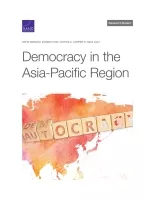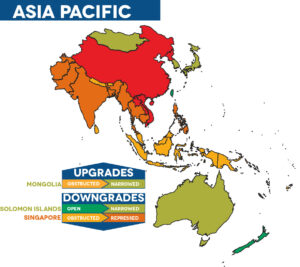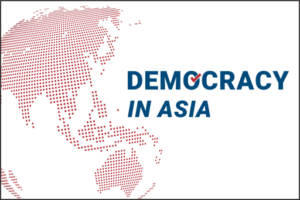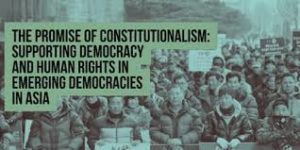 A promising cross-sector initiative has the potential to create a platform for advancing democracy in the Indo-Pacific region, says a leading protagonist.
A promising cross-sector initiative has the potential to create a platform for advancing democracy in the Indo-Pacific region, says a leading protagonist.
At a recent forum of the Sunnylands Initiative, leading civil society figures, former government officials, and academic experts assessed the state of democracy in the region and brainstormed strategies for strengthening democratic governance and respect for human rights, writes Freedom House President Mike Abramowitz. The conversations were held under the auspices of the group, launched in 2020 at the former Annenberg family estate in California by the National Endowment for Democracy (NED) and the Center for Strategic and International Studies.
The hope of the Sunnylands group is, over time, to turn talk into action— for instance, to address the needs of displaced activists across the region by providing refuge, fellowships, and other kinds of support, Abramowitz adds. One possibility would be to create a new democracy “architecture” for the Indo-Pacific that would draw resources from democratic governments and invest them in prodemocracy efforts, as does the NED or the Taiwan Foundation for Democracy. RTWT

CIVICUS
“Asia currently lacks regional infrastructure to support civil liberties, freedom, and rules-based order,” says Lynn Lee, NED’s associate director for Asia. “The Sunnylands Initiative provides a new platform for democratic leaders to debate, design, and advance a shared vision that ensures regional governments are transparent, accountable, and inclusive of all citizens, while respecting the rule of law and protecting human rights and dignity.”
The Indo-Pacific region has been designated as the US’s top priority theater, notes Ambassador Bilahari Kausikan of the National University of Singapore, and former Ambassador-at-Large, Ministry of Foreign Affairs of Singapore. He discussed the influence of the US-China competition in the Southeast Asia (SEA) region at the Atlantic Council (see below).
 Thailand, Cambodia and Myanmar cannot yet be called fully authoritarian, like Russia and China. Japan can be the country to bring true stability to the region, in part because those states have three things in common, analyst Norimasa Tahara writes for The Straits Times:
Thailand, Cambodia and Myanmar cannot yet be called fully authoritarian, like Russia and China. Japan can be the country to bring true stability to the region, in part because those states have three things in common, analyst Norimasa Tahara writes for The Straits Times:
- First, many citizens have expressed their opposition to the government. In Thailand, the youth who led the movement to restore nonmilitary government have connected with one another on social media and are looking for opportunities to call for the military-led government to step down. In Cambodia, although the ruling party won a landslide victory in local elections in May, the successor to the dissolved opposition party did not fare badly. In Myanmar, citizens are taking up arms and continuing to resist the military across the country.
- Second, all three countries have strong economic ties with China. Cambodia has been particularly dependent on China for infrastructure development. ….It is quite natural for these three countries to think, “Even if the West hates us, we still have China,” in light of China having become a superpower that competes with the United States. One cannot dismiss the possibility that they may have learned from China that authoritarianism is acceptable so long as economic development is maintained.
- Third and finally, these countries also have close relationships with Japan. In Thailand, roughly 6,000 Japanese companies have set up operations, making Thailand an industrial hub for Asia. In Cambodia, Japan contributed to the country’s reconstruction after the Pol Pot regime, and it has close historical ties with Myanmar.
Because Japan has already shown an important presence in these countries, perhaps it can also play a great role in helping them restore authentic democracy, Tahara suggests.
If there is any hope in stopping the spread of autocracy in Southeast Asia, at least from the perspective of the United States foreign policy establishment, then political support and material resources must be provided to state and nonstate actors that are committed to competitive electoral processes, democratic governance and human rights, argues Salvador Santino F Regilme Jr., an Assistant Professor in international relations and human rights at Leiden University, the Netherlands.
 Those actors include progressive civil society groups and independent journalism and media outlets which can counter the widespread disinformation perpetrated by autocratic elites., he writes for the East Asia Forum. Military and state elites who are committed to re-establishing democratic civilian control and opposition politicians who have been consistent in upholding the interests of those in the margins should also be supported.
Those actors include progressive civil society groups and independent journalism and media outlets which can counter the widespread disinformation perpetrated by autocratic elites., he writes for the East Asia Forum. Military and state elites who are committed to re-establishing democratic civilian control and opposition politicians who have been consistent in upholding the interests of those in the margins should also be supported.
“Despite growing challenges, the Indo-Pacific region has made incredible strides with successive waves of democratization, thanks to the resilience and determination of ordinary people who continue to aspire and struggle for fundamental freedom and human rights,” says NED President and CEO Damon Wilson. “The Sunnylands Initiative celebrates this impressive progress and will work to strengthen a regional commitment to democratic governance that delivers.”
Japan can give authoritarian regimes like #Thailand, #Cambodia and #Myanmar a neighborly nudge toward #democracy, Norimasa Tahara writes for @Yomiuri_Online https://t.co/iVBIwlkdV8
— Democracy Digest (@demdigest) August 18, 2022







